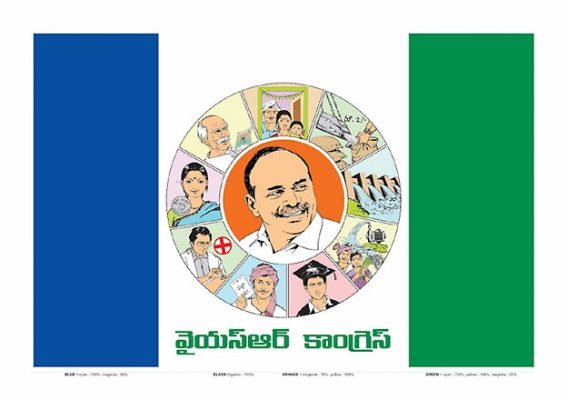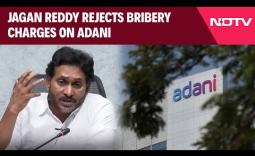*Indapur Dairy scam exposed; Govt avoiding debate*  *Govt responsible for Madanapalle Incident*
*Govt responsible for Madanapalle Incident* *Rising crimes, Ghee tender scandal and Heritage–Indapur link: Govt dodging accountability*
*Rising crimes, Ghee tender scandal and Heritage–Indapur link: Govt dodging accountability* *YS Jagan mourns demise of Senior Congress leader and Former MP Ratnabai*
*YS Jagan mourns demise of Senior Congress leader and Former MP Ratnabai* *YS Jagan extends wishes to JEE toppers*
*YS Jagan extends wishes to JEE toppers* *Faith should not be targeted for politics: Tirumala laddu truth exposed*
*Faith should not be targeted for politics: Tirumala laddu truth exposed* *Caste bias has crippled welfare hostels; 900 students fall ill*
*Caste bias has crippled welfare hostels; 900 students fall ill* *YS Jagan mourns demise of Former MLC Ailapuram Venkayya*
*YS Jagan mourns demise of Former MLC Ailapuram Venkayya* *YS Jagan’s rule brought real empowerment to Tribals, say leaders at Sant Sevalal Maharaj Jayanti*
*YS Jagan’s rule brought real empowerment to Tribals, say leaders at Sant Sevalal Maharaj Jayanti* *Budget, a bundle of lies*
*Budget, a bundle of lies*
Jagan writes to Prez Pranab over division
25 Feb 2014 5:17 PM

Y
S Jagan Mohan Reddy, MP
Dt: 24th February 2014
President
To:
Shri
Pranab Mukherjee ji
H
E President of India
Rashtrapathi
Bhavan
NEW
DELHI
Respected Sir,
Subject: Division of Andhra Pradesh
I sought your appointment to explain in person, the
gross injustice that befell on the people of Andhra Pradesh with both Houses of
the Parliament passing the State Reorganisation Bill 2014.
As I could not get your appointment, I place my views
on the issue in this letter and submit to you.
The whole nation is aghast at the way the
Parliament, especially the Lok Sabha, passed the AP Reorganisation Bill 2014
(Bill) with a voice vote, suspending almost all the MPs from Seemandhra region
and blocking out the TV coverage. Even now it is not correctly known as to
whether the proceedings of such an important occasion are video-graphed or not.
It was certainly a black day for the world’s largest democracy and for young
MPs like me, this is not something we would like to learn. Our Party tried our
level best to stop the bifurcation of Andhra Pradesh as it is done against the
majority decision of the State Assembly and the aspirations of a vast majority
of people of our state. We tried our best to enlist the support of all
opposition parties in Parliament to stop this dangerous precedent from becoming
a new convention. All our efforts were in vain. Probably there is very little
that one can do when the ruling Party
and the principal Opposition Party come together and decide to divide a
State against all established Constitutional conventions, precedents and
practices and against federal spirit, which is one of the basic features of our
Constitution.
The BJP, which emphatically said that they would
never allow the Bill to be considered in Lok Sabha unless the suspension of all
the MPs was revoked and a full-fledged discussion on the Bill takes place, for
reasons best known to them, cooperated with the ruling party for dividing
India’s first linguistic state without revoking the suspension of members and
without any discussion, giving a complete go bye to all the established
Constitutional conventions, practices and precedents, which require that a new
state can be created either on the basis of recommendation of a Commission or a
committee or upon receipt of a request from the state legislature. Sadly, in
this case, both AP Legislative Council and Assembly have rejected the AP
Reorganisation Bill in its entirety and despite this, most unethically, the Union
Government for the first time in post-independence India, went ahead hurriedly
pushing the Bill through in a manner that has lowered our country’s esteem.
Where was the need for the Union Government to embark upon this important issue
at the fag end of their ten year tenure, particularly when the schedule for the
General Elections 2014 was just ten days away?
Surprisingly, there was almost a repeat performance
in the Rajya Sabha, except that live telecast was not blocked. The BJP, which
said that they could not propose any amendments to the Bill in Lok Sabha
because, in their opinion, the Bill was not introduced in Lok Sabha, however,
proposed 20 odd amendments in Rajya Sabha and declared in unambiguous terms
that they would not allow the Bill be passed unless all the amendments were
passed. Surprisingly, what happened latter was completely at variance with all
they said. The BJP, as in the case of Lok Sabha, willingly cooperated with the
ruling party in passing the Bill with a voice vote despite none of their 20
amendments were accepted. Even the request of BJP for division on the
amendments was not accepted. The Hon’ble Dy Chairman pleaded helplessness in
conceding to the demand of BJP for division on the amendments on the ground
that the House was not in order, while the same did not come in the way for
passing the Bill through a voice vote! Thus, the ruling party managed to get
the support of BJP for the passage of the Bill without any of their amendments
being accepted!
The Prime Minister, however, gave some assurances,
which, inter alia, include
1. Special
Category Status will be extended to the successor state of Andhra Pradesh
comprising 13 districts, including the four districts of Rayalaseema and the
three districts of north coastal Andhra for a period of five years. This will
put the state's finances on a firmer footing.
2. The
Bill already stipulates that the Central Government shall take appropriate
fiscal measures, including offer of tax incentives to the successor states in
order to promote industrialization and economic growth in both the states.
These incentives will be along the lines extended to some other states.
3. I
would like to reassure Honourable Members that if any further amendments are
needed to facilitate smooth and full Rehabilitation & Resettlement(R&R)
for the Polavaram project, they will be given effect to at the earliest. Our
government will execute the Polavaram project--let there be no doubt about it.
4. The
resource gap that may arise in the successor state of Andhra Pradesh in the
very first year, especially during the period between the appointed day and the
acceptance of the 14th Finance Commission recommendations by the Government of
India, will be compensated in the Regular Union Budget for 2014-15.
The moot point is whether there is legal tenability
for the aforesaid assurances, particularly when they do not form part of the
Bill. Will the next Government be bound by the assurances given by a
Government, which is on its way out? There is no clarity as regards what is
meant by Special Status for Residuary state in the context of the point no 1
supra. If the fiscal incentives are given on par to both the states as per
point no 2 supra, how can one expect the residuary state, which has been
totally denied of its due share in manufacturing and IT business left behind in
Hyderabad Metropolitan development area, to develop? Similarly, there is no
clarity about the shortfall in the revenues of the residuary state. There is
bound to be huge revenue deficit in the residuary state beginning with Rs
15,000 crores in the first year and this will gradually go up with each year
passing as the residuary state which is forced to leave behind the engine of
economic growth which is Hyderabad, in Telangana state, can never step up its
revenues to cover the revenue expenditure. Para 4 supra says that the deficit
in the first year alone will be compensated in the regular Union Budget
2014-15, without making it clear as to who will meet the revenue deficit from
the second year onwards specially when the engine of growth (Hyderabad) is no
longer with the residuary state and knowing very well that another engine of
growth like Hyderabad to be created will take atleast 20 years’ time or even
more. If this is not properly addressed, it will be a death-knell to the
residuary state.
Since the Krishna river Ayacut spreads over 11
districts (2 ½ districts in Telangana & 8 ½ districts in Seemandhra ), the
entry point in to Andhra Pradesh through Gadwal and Alampur constituencies,
which is are a part of the Mahaboobnagar district now, it is very important to
ensure that this part (mouth) should not be tampered with. Keeping in mind the
future of these 11 districts, this area should be declared as “no tamper zone”.
As it is, our State has been facing similar problems with both Karnataka and
Maharashtra be it Almatti or Babli.
Dummugudem to Nagarjuna Sagar Tail Pond Project
which is the only life line for Krishna Ayacut stabilization has no clarity.
The ownership and the operational modalities of
dams, Srisailam and Nagarjuna Sagar should be clearly defined and the
boundaries be clearly demarked as these dams have the gates on both the sides.
There is no mention in the Bill as to the funds
required for building new capital in the residuary state and as to how it will
be funded by the Union Government. One should remember that a mere legislature,
high court, Secretariat and Govt.
buildings alone do not constitute the term ‘Capital’. One should not forget the
fact that ‘Hyderabad’ is being denied
unjustly and should be properly compensated for the residuary state. Even the
time limit within which the Union Government would release funds for the
Capital is also not part of the Bill. It should be borne in mind that something
as a basic Metro costs Rs 20,000 crores and an International Airport costs Rs
5,000 crores. The Union Government should give the time frame for completion of
the ‘capital’, which has to be at their cost.
If one goes by the experience of Chhattisgarh, which after 14 years
after formation, has received a paltry sum of Rs 400 crores as against that
Government’s requirement of Rs 10, 000 crores in those days, 14 years ago
.There is no surprise that even in respect of the residuary state in this case,
things will be no different. This fear should be adequately addressed.
Having denied Seemandhra its share in the share
capital of the AP government in ‘Singareni Collieries Company Limited’, the
only source of Power generation, there should at least be a provision in the
Bill that ‘Royalty’ on natural gas, be it on-shore or off-shore, accrues to the
residuary state instead to the Union government, as the drilling has severe
ramifications of seismic activity & effects fishing activity adversely in
the State. Union government’s share in these gas blocks in AP should be
transferred to the State government of the residuary state as this would assure
the State government of availability gas which is locally produced at
affordable prices.
Special Category Status for 5 years will not serve
any purpose as the minimum gestation time to set up any industry is 3 to 5
years and any engine of growth like Hyderabad to be created to compensate for
the Revenue gap will take at least 20 years or even more. In this context how would
this serve any purpose? This should be made at least 15 years to yield some
result with specifics to compensate for revenue gap for at least 15/20 years.
In the light of the above, we request you to kindly
ensure that at least our above concerns are addressed in a legally tenable
manner.
I have enclosed a detailed note on state revenues
for your kind perusal.
With Regards

















